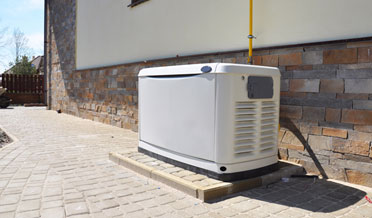Whole Home Back Up Generators
Whole Home Back Up Generators: What You Need to Know
Portable generators have been around since the mid-1960s. At first, they were small and weak compared to today’s models. They were handy for bringing electricity to remote locations—campsites or cabins, remote work locations, or anywhere electricity was needed off-grid.
They grew from small hand-held units to present, Whole Home Back Up Generators that are installed with a forklift. Today, prudent homeowners are buying and sometimes installing backup generator systems in preparation for emergency power outages.
Most power outages happen due to weather events with lightning and high winds. However, winter storms can also lead to power outages and not just in the frigid northern states, as we saw in February of 2021. The combination of snow, ice, and even moderate wind, has taken down a fair share of power lines.
Being without power in the winter can be exceptionally uncomfortable—even dangerous. If you have a backup generator in place or are considering a back up generator, here are some things to consider for using a generator during the heating season.
- The two most common types of residential heating systems in the south use either electricity or fossil fuel to generate heat to keep you comfortable. However, both use electricity to move the air and neither will function without electricity.
- It is important to keep your HVAC system well-maintained so it will function well when you really need it. A fireplace can serve as a backup heat source during power outages, but it will also need to be maintained and an ample supply of fuel available.
Generator Options
With every purchase, there are options and generators are no different; size and fuel types are two good examples.
- Portable generators are mobile and versatile. When a power outage occurs the portable unit is removed from storage, extension cords run from the generator to the appliances you wish to power, and the unit is started to produce adequate electricity for emergency needs. If you need to power your furnace, it will take preparation, since HVAC systems receive power from the service panel.
- Permanent generators are installed, often connected to the local gas utility and hooked directly to the home’s electrical service panel. A transfer switch is installed that prevents the power generated from flowing to the power grid, endangering workers and other homes. With a transfer switch, you can choose which circuits to empower to keep your family safe and comfortable.
Tips for Using a Back Up Generator Safely
- You will need to check the fuel, oil, and battery regularly, to ensure it is ready during an emergency.
- Any generator should be a safe distance from the home.
- A backup generator takes preparation. Whole Home Back Up Generators will require the installation of a transfer switch to keep everyone safe. As soon as the generator starts, the switch disconnects the home from the power grid. When power is restored to the power grid, the switch disconnects the generator.
Have Questions About Your Back Up Generator?
With our four decades of experience as a Residential Electrical Contractor, AirPro Houston provides you with the skill and expertise to help answer your Back Up Generators questions.
We have financing options available with great options with up to 72-month terms with approved credit. Call our teams of Electricians at 281-880-8805 and let us partner with you for all of your electrical repair, Home Generator installation, and electrical installation needs.

